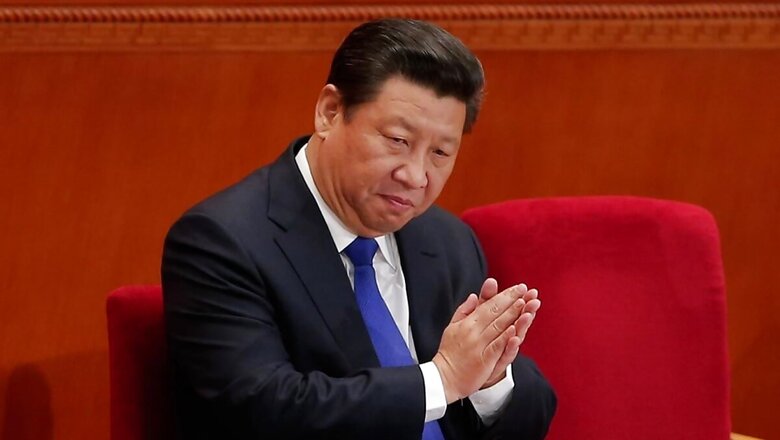
views
It is becoming clear that the Biden government intends to pursue a tough policy towards China. Its Interim National Security Strategic Guidance confirms this. China will be countered on many fronts: human rights issues in Xinjiang and Tibet, threats to Taiwan, violating Hong Kong’s autonomy, encroachments in the East and South China Seas, freedom of navigation and overflight issues, preserving a free and open Indo-Pacific, unfair trade practices, resilience of critical supply chains, new technologies, standards for 5G, a new US industrial strategy, and so on.
Unlike the Trump government which created ruptures with allies and weakened America’s hand in dealing with China’s challenge, the Biden government seeks to speak to China from a position of strength, for which priority attention is being given to Japan, South Korea and Australia. It reached out to Europe for policy coordination towards China even before it took office, but Europe, led by Germany, rejected the overture and proceeded to sign a Comprehensive Investment Agreement (CAI) with China to advance its own independent interests in China. It succumbed to Beijing’s tactics to derail the build-up of a common transatlantic front against China.
The US has continued its coordinating efforts but faces resistance from some major EU countries who want to retain their independence in policy making towards China, believing that the economic interests of the US and Europe are often competitive in the Chinese market. However, recent developments have soured the atmosphere in EU-China ties. China has retaliated strongly to EU’s decision to sanction four Chinese officials for human rights violations of the Uighurs with its own sanctions on some sitting Members of the European Parliament, EU officials and some entities. This could put in jeopardy the ratification of the CAI by the European Parliament. The Uighur issue has roiled China’s relations with the UK and Canada too, who along with the US, have also imposed sanctions on the Chinese officials concerned.
Separately, China’s strategy to weaken EU unity and bring the eastern European, Baltic and Balkan states into its orbit through the 17+1 format has begun to run aground, with some Baltic states and Poland disillusioned with the economic promise of the grouping. The latest move by China to send its Defence Minister to three Nato states and Serbia and Moldova shows that it is not giving up.
A Change in climate
The decision to hold a virtual Quad summit was part of the US strategy to signal a more robust response to China’s aggressive behaviour, which India joined, ignoring Chinese sensitivities even when the process of disengagement in eastern Ladakh has not been completed. The visit of the US Defence Secretary to India coincided with the US-China meeting in Alaska. China was not mentioned in the joint statement issued by the Quad leaders but it figured in the discussions, with each leader expressing their thinking. It was rightly felt by all that the Quad should have a broader agenda than simply China, so that the four countries develop the habit of working together for common causes. It is in this perspective that the decision on building India’s capacity for vaccines should be seen. This and other issues discussed have a clear China angle, as can be seen from the three expert groups set up on vaccines, critical technologies (5G, AI, Quantum Computing, human biology) and climate change, respectively.
ALSO READ| ‘Friendships are Not Alliances of Containment’: The China Factor in India’s Quad Calculus
The need to give comfort to Association of Southeast Asian Nations or ASEAN is recognised by the Quad countries, which is why its centrality is stressed. Indonesia is important, with the US recognising that it has not paid enough attention to that country till now, which is in line with the thinking and efforts of India, Japan and Australia. At Alaska, the Chinese apparently bristled at the US mentioning its dialogue with India.
It is clear that China’s expectations that a change of administration in the US could lessen tensions and some accommodation could be worked out have been belied for the time being. They touted the Alaska meeting as a strategic dialogue, which the US side studiously refuted. In response to Secretary of State Antony Blinken passing severe strictures on China’s infringements of a rules-based international order on various issues, Politburo member Yang Jiechi hit back brutally, decrying US democracy, castigating America’s racism, calling it the champion of cyber attacks, rejecting the notion that western nations represent global public opinion, and, most significantly, stating that the US did not have the qualifications to speak to China from a position of strength, now or even 20 or 30 years earlier.
China would have intended to say all this in private but felt compelled to do so in public to show to the domestic and international audience that China will not be bullied and will deal with the US as an equal. If Yang Jiechi had reacted meekly, it would have been a blow to China’s prestige and the self-importance with which it is now acting on the international stage. Apparently, after the public acrimony, the two sides got down to their agenda in earnest, with serious differences over Taiwan, which could become a flash point. There was no commitment by the US side to meet again despite persistent probing by Yang Jiechi.
China’s disruptive global ambitions
China has exhibited its defiance of world opinion for some time now. Its belief that the US is a declining power and China’s rise is unstoppable grew after the 2008 financial crisis and has grown stronger after the pandemic, which it feels has demonstrated the superiority of its system, weakened the western economies, and has given it an opportunity to expand its influence and power. That China got away with encroachments in the South China Sea gave it the confidence that it could assert its sovereignty rights in violation of international law, and that the US would not risk a conflict on an issue of major importance to China but of secondary importance to the US.
Similarly, in the case of the Senkaku Islands, its strategy has been to create a sense of uncertainty in Japanese minds about the US willingness to challenge Beijing robustly on this issue, quite apart from the cold-blooded calculation that an economically sluggish Japan will not risk its enormous economic stakes in China. They have bullied South Korea on the issue of positioning a THAAD anti-missile system on its soil to show that Seoul cannot take such decisions without deference to Chinese security concerns, which means denying a free hand to the US in the region. This explains why the recent 2+2 dialogue between US and South Korea made no mention of China, while that with Japan was robust on China, which prompted the latter to demeaningly call Japan a vassal state of the US.
ALSO READ| Diplomatic Tightrope: India Sides with US Against China, Tries to Keep Russian Goodwill
India has also been the victim in eastern Ladakh of China’s omni-directional aggressive policies. Why China should have chosen to violate several border management agreements with India by moving 50,000 combat-ready troops into eastern Ladakh remains unclear. This is one instance where Chinese calculations of a cost-free assertion of sovereignty have not been met, with India’s robust response forcing it to retreat militarily. While, for the time being, the immediate threat from China has been thwarted, the long-term threat from China will continue as part of its disruptive global ambitions that the US now seems ready to counter. The fall-out of these ambitions will be felt by India as the only Asian country capable of thwarting China’s hegemony in Asia. This will require accelerated efforts by India to build its comprehensive national power.
A new version of Cold War?
While one can understand why China would want to debunk what it may consider unjustified propaganda against it, it is transgressing the limits of diplomatic conduct through its “wolf warrior diplomacy”, exhibited dramatically at the Alaska meeting. Why China thinks it can alienate the US, Europe, Japan, parts of ASEAN and India without cost is not easily understandable. China has profited the most from globalisation and its relations with the West and Japan. Its economy is inextricably linked to the rest of the world, and this is the underlying rationale of the Belt and Road Initiative.
It has many vulnerabilities in the face of a concerted push back, as its sea lanes of communication can be disrupted. Lack of bases and forward military deployments makes distant power projection by it difficult. It can improve its position by developing more military and cyber capabilities, but that will not protect it from counter-attacks. If its calculation is that its control of global supply chains, monopoly over some critical raw materials and lead in developing advanced digital technologies with use of AI gives it an upper hand in international dealings, and that the rest of the world, including advanced economies who also depend on exports and profitable investment to sustain their economies, cannot dilute their links with the Chinese market, it is engaging in brinksmanship that can prove dangerous for global peace and stability. China needs a tension- and conflict-free world as much as anyone else. Any notion of a Middle Kingdom is obsolete.
With China and Russia in the cross-hairs of the Biden government, it is not surprising that both countries have closed ranks against the US and Europe. Their foreign ministers have recently called on the US to “halt unilateral bullying, stop meddling in other countries’ domestic affairs, and stop forming small circles to seek bloc confrontation.” They have proposed setting up a new “regional security dialogue platform to converge a new consensus on resolving the security concerns of countries in the region”, rejected US calls for “a rules-based order” and have proposed a summit of the UN Security Council’s five permanent members “to establish direct dialogue …in the interests of maintaining global stability”. A new version of the Cold War might now be taking shape.
On July 1, when the CCP (Chinese Communist Party) celebrates its centenary, Xi Jinping’s speech and the documents emerging from it will give an indication of what lies ahead for the world that is coming to grips with China’s disruptive rise.
Read all the Latest News, Breaking News and Coronavirus News here




















Comments
0 comment